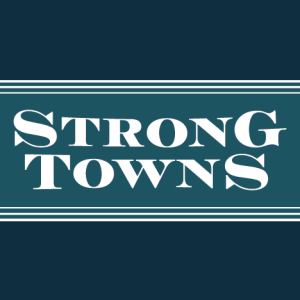
Our last new podcast episode of this year finds Strong Towns founder and president Chuck Marohn busily baking cookies ('tis the season), and musing on a series of questions posed to him by a Detroit-based journal.
The questions get at the heart of some of the hot-button issues in urban planning: the legacy of systemic racism in our cities, the role that urban planning might play in combatting and correcting for this legacy, and how 21st-century fads (the "creative class", new transportation technologies, et cetera) play into the discussion.
Chuck questions the notion that contemporary planners-with-a-capital-P are well-positioned to correct for the mistakes of the past, particularly with regard to racial segregation and disparities in our cities. One reason: we haven't really reckoned honestly with that legacy.
It's easy to caricature redlining and other past policies—"Wow, that's just horrifically racist! We today would see that as beyond the pale." And yet, Chuck argues, we do things today that produce more or less similar results. Segregation is still pervasive, and so are disparities in economic outcomes. At the level of top-down policy, especially federal policy, unfair outcomes have a way of embedding and perpetuating themselves. And it's not because most individuals are mean-spirited racists of a sort we can simply dismiss as incomprehensible to our modern, enlightened selves.
There are tougher questions we need to ask ourselves about who gets the power to shape cities. Those with advantages—with preferential access to the levers of the system—are going to use those advantages for the benefit of themselves and those they care about. "How," Chuck asks, "do we empower communities that are disempowered today so that they have that capacity as well? So that they can lift themselves up, the ones they love up, and the people around them up?"
Until we reckon with that question, our cities will too often be fragile places AND places where the least powerful suffer the most.
Listen to this podcast episode for more on this topic, as well as Chuck's take on:
- The importance of the "creative class" in cities, and what planners sometimes get wrong about the concept.
- Why both the political left and right invoke images of the post-World War II era as a model to aspire to today.
- Why the economy ought to be more like a person walking and less like a person on a bike. (Hat tip to Tomas Sedlacek.)
- Why scooters are great, but scooters aren't the answer to carbon emissions or car dependence.
- Why the same is true for (insert transportation technology here).
More Episodes
 2017-10-26
2017-10-26
 1.6k
1.6k
 2017-10-23
2017-10-23
 1.6k
1.6k
 2017-10-19
2017-10-19
 1.5k
1.5k
 2017-10-16
2017-10-16
 1.3k
1.3k
 2017-10-12
2017-10-12
 1.4k
1.4k
 2017-10-09
2017-10-09
 1.4k
1.4k
 2017-10-05
2017-10-05
 1.7k
1.7k
 2017-10-02
2017-10-02
 1.3k
1.3k
 2017-09-28
2017-09-28
 1.2k
1.2k
 2017-09-25
2017-09-25
 1.2k
1.2k
 2017-09-21
2017-09-21
 1.3k
1.3k
 2017-09-18
2017-09-18
 1.2k
1.2k
 2017-09-14
2017-09-14
 1.1k
1.1k
 2017-09-12
2017-09-12
 965
965
 2017-09-07
2017-09-07
 1.2k
1.2k
 2017-09-05
2017-09-05
 996
996
 2017-08-31
2017-08-31
 1.2k
1.2k
 2017-08-21
2017-08-21
 1.1k
1.1k
 2017-08-17
2017-08-17
 1.1k
1.1k
 2017-08-14
2017-08-14
 986
986
Create your
podcast in
minutes
- Full-featured podcast site
- Unlimited storage and bandwidth
- Comprehensive podcast stats
- Distribute to Apple Podcasts, Spotify, and more
- Make money with your podcast
It is Free
- Privacy Policy
- Cookie Policy
- Terms of Use
- Consent Preferences
- Copyright © 2015-2024 Podbean.com



